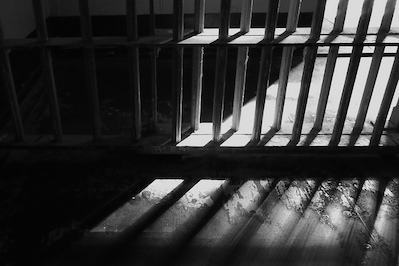Barring Prisoners From Voting Undermines Democracy
In most states, people's firsthand experience of the criminal justice system can’t be part of the political debate on how to reform it. powelli / CC BY-ND 2.0
powelli / CC BY-ND 2.0
For those who have done time in U.S. prisons, punishments often extend beyond the point of sentencing, reaching well into their post-prison lives. From job applications that inquire into one’s criminal background to states throwing people back in prison for failing to pay fees they owe to the state, the penalty decreed by the judge can be more extensive than it initially appears.
A staggering 5.85 million Americans weren’t able to vote in 2014 because of laws that disenfranchise citizens. While much attention has been given to freed citizens who can’t vote because of a previous felony, less has been paid to those still behind bars who may want to take part in the voting process.
Many criminal justice reform advocates see this as a vital need, but as of now, only two states give prisoners the right to vote: Vermont and Maine. This number has shrunk in recent years. Until 2000, Massachusetts allowed prisoners to vote in elections, but that right was taken away by state lawmakers. When some Massachusetts prisoners launched a political action committee to try to change laws connected to their crimes, local legislators responded by changing the state Constitution to bar voting from prison. A lawsuit claiming that this policy disproportionately affected minorities was rejected by the Massachusetts Supreme Court in 2010.
Utah allowed prisoners to vote until 1998, when a House joint resolution stripped inmates of that right.
The only state offering a glimmer of hope in recent years is Hawaii, where supporters of a new bill that would grant prisoners voting rights argue that disenfranchisement disproportionately affects minorities.
That’s often the case that’s made when advocates argue for giving voting rights to the more than 2 million people currently behind bars. Because our country’s criminal justice system disproportionately targets minorities over whites, this line of argument suggests, granting prisoners (and former prisoners) voting rights often means granting voting rights to more minorities.
The issue of the enfranchisement of inmates affects our democracy in other ways that may be less obvious. According to people who have direct experience with the criminal justice system, the right to vote means that their experience can be part of the debate over what the criminal justice system should look like.
“In terms of how our criminal sanctions are enforced and how our prisoners are treated … they have a critical viewpoint that is frequently lacking in the debate over criminal justice,” Dale Ho, director of the ACLU’s Voting Rights Project, told Truthdig. (It should be noted that the ACLU doesn’t currently take an official stance on prison voting rights.)
Ho believes that a democracy makes the best decisions when people of all backgrounds have a voice, but right now, most prisoners around the nation don’t have a voice.
“If we take a huge chunk of our society and excommunicate them from civic life, and they’re the only people who have had certain experiences, then we’re depriving … ourselves, in our democratic debate, [of] a viewpoint that could help us make better decisions,” Ho said.
Disenfranchising prisoners may also affect their home communities. Marc Mauer, executive director of the criminal justice reform organization The Sentencing Project, told Truthdig that blocking prisoners from voting could “depress voter turnout among family members, even those who don’t have felony convictions themselves, if you think about voting as a communal process.” He essentially believes people talk about voting and vote in groups, and thus people who are aware that many in their community can’t vote will be less likely to vote.
Voting can also help inmates feel involved in their community and more invested in it.
“Ninety-five percent of the people in prison are coming home someday, and they’re going to face a lot of challenges when they come home, and it’s in everyone’s interest that they have strong connections to the community,” Mauer said. “If they feel they are part of the political culture and the community, people who feel connected are going to be less likely to victimize their neighbors.”
Mauer also pointed out that politicians may also be less likely to campaign in areas that have high incarceration rates.
Granting prisoners their voting rights isn’t a strange idea in many places outside the United States. Both Ho and Mauer noted that many European countries allow detainees to vote. “I think they view that as a part of the process of rehabilitating people and preparing them for reintegration into society,” Ho said.
But here in America, it’s a vicious cycle. Many citizens who have spent time in prison are barred from full participation in their democracy, and in particularly strict states such as Florida, where a felony conviction means a lifelong ban from voting (10 percent of the state can’t vote for various reasons), some people may never know what it’s like.
When a nation that claims to be a representative democracy only registers the wishes of certain kinds of people, the system as a whole fails its constituents.
Your support matters…Independent journalism is under threat and overshadowed by heavily funded mainstream media.
You can help level the playing field. Become a member.
Your tax-deductible contribution keeps us digging beneath the headlines to give you thought-provoking, investigative reporting and analysis that unearths what's really happening- without compromise.
Give today to support our courageous, independent journalists.






You need to be a supporter to comment.
There are currently no responses to this article.
Be the first to respond.